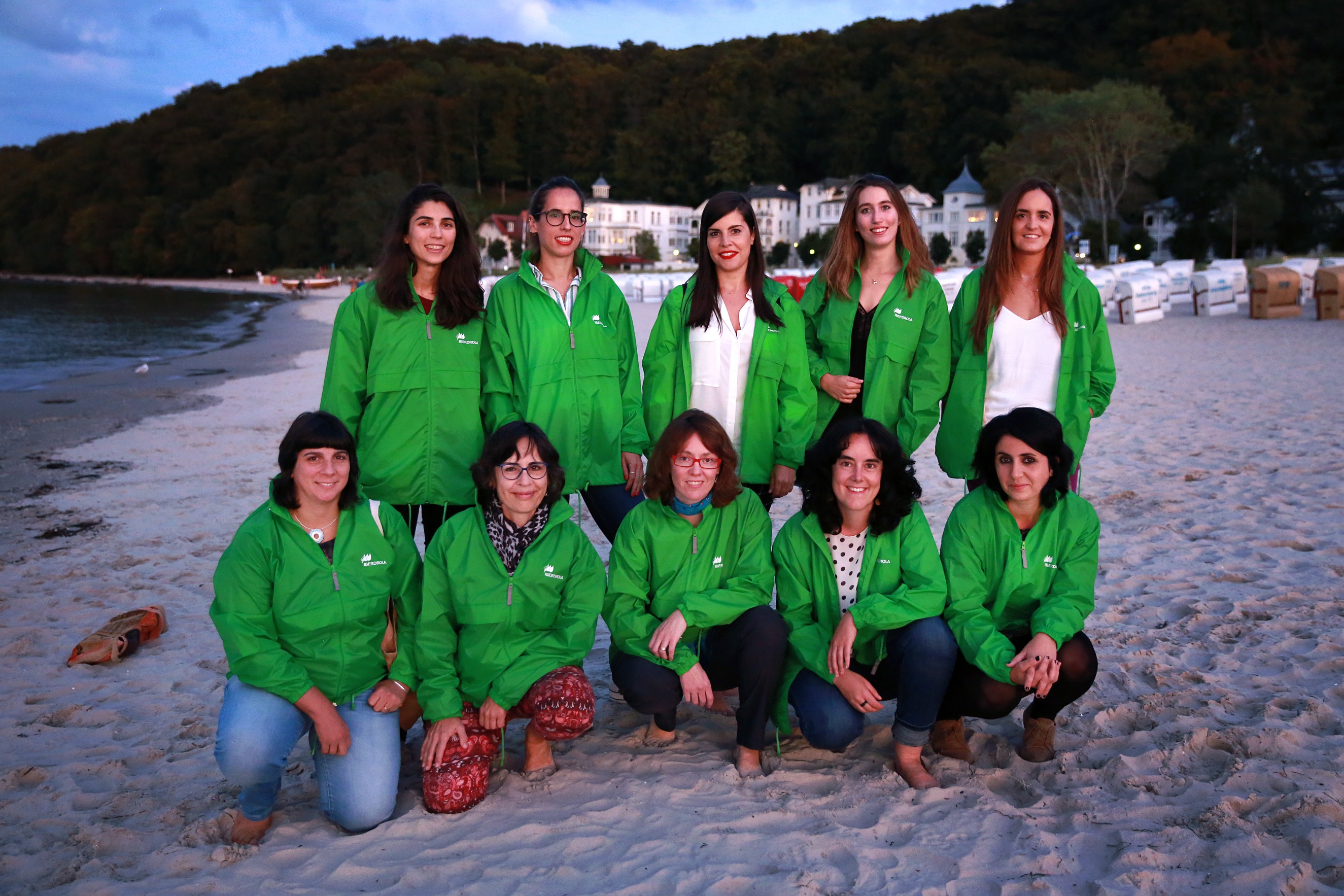No-one any longer doubts the importance of renewable energy sources in combating climate change. But it’s one thing to imagine it, and quite another to see with your own eyes how innovation in new clean technologies is helping to change the world as we know it.
This was the experience of a group of prominent women specialising in science, technology and engineering, who recently visited Iberdrola’s Wikinger offshore wind farm in the German sector of the Baltic Sea. A unique opportunity for researchers from different disciplines to share a common concern: climate change.
In a multi-discipline gathering in Germany Lara Lázaro, the lead researcher on climate change in the Royal Elcano Institute, who also holds a doctorate from the London School of Economics and Political Science, environmental scientist Cristina Arias-Navarro, scientific YouTuber Rocío Vidal (better known as Schrödinger’s Cat), oceanographer Susana Bastón and renewable energy expert Paula Serras, among others, debated the challenges involved in halting or slowing climate change, the need to commit to a new energy model and the pressing obligation to improve the quality of the air we breathe.
All of which also shared a common objective: to bring about greater equality in the areas of science and technology, for which it is essential to increase vocation among girls and provide them with role models in order to start reducing the gap between men and women in these disciplines.
“Climate change is one of the major challenges facing us and it involves changing everything we do, so the challenge is immense”, Lara Lázaro acknowledges. “There is an international framework, the Paris Accord, whereby the international community established the bases for changing the energy model. We have the technology, the numbers starting to come out and we must set to it all together and not slip back”, she adds.
The doctor in scientific ecology heading the Air Pollution Ecotoxicology Unit of the Environmental and Technological Energy Research Centre (CIEMAT), Rocío Alonso, who studies how climate change is affecting ecosystems, thinks it is necessary to promote research, both public and private, and to try to promote the transfer of this research to society at large.
Renewables, key to the circular economy
For Adela Conchado, who holds a doctorate in industrial engineering from the Pontificia Comillas University, “making the best possible use of the resources that nature provides us with is essential, and energy from renewable sources has a key role to play in this transformation to the circular economy. If we don’t have clean energy, it won’t be possible to live in harmony with nature”, affirms Adela, who believes that “coming to this event together with other women who are also working on sustainability from different perspectives gives me hope that together we can achieve it”.
Cristina Arias-Navarro, an environment scientist with the National Agronomic Research Institute (INRA) in Paris, is clear about it: “despite the scope and breadth of the Paris Accord, in which all countries agreed to limit the increase in temperature to 2ºC, projections indicate that we’re in route to 3º, which will have catastrophic consequences”.
“Energy form renewable source is fundamental in the fight against climate change”, says Paula Serras, doctor of chemical engineering and teacher at the University of the Basque Country who, as a wind power researcher affirms that, “just as wind and solar have grown in importance, it’s essential to promote research into wave energy”.
For her part, Vigo University oceanographer and researcher Susana Bastón recalls her eight years working as a researcher in the Orkneys, north of Scotland, where she learnt that “society has the power to change the world”. “In these islands they’re seeking to change the energy model with a mix of renewable offshore wind and wave power. I’d like to see this energy transition in Spain too”, she says.
“One of the things I liked on this trip to Wikinger was discovering how many women engineers are working on this wind farm”, says IT engineer and Digital Manager of the University of Deusto, Lorena Fernández.
Among them is engineer Patricia Berlín, from Iberdrola’s offshore renewable energy operation and maintenance area, who explained the importance of this facility to the participants. “The offshore wind farm consists of 70 turbines, each of 5 megawatts and supplies electricity to 350,000 households”. Patricia describes the experience of working on a multicultural project such as Wikinger as enriching.
Engineer Carlota Armillas, the only Spanish woman to obtain a scholarship from the Gates Foundation for Cambridge University, considers, at age 23, that “if we want to take care of our planet, which is our home, we have to understand that engineering must be respectful towards the environment”. “We engineers have a real responsibility to the environment, since improving the productive processes, reducing CO2 emissions and wasting fewer materials are in our hands”.
Scientific YouTuber Rocío Vidal, better known as ‘Schrödinger’s Cat’, thinks environmental awareness is very important. “We need an ecological transition, and it’s a commitment of influencers, companies and institutions. Society must be aware of we must head towards and where we should already be”.
Lastly, the director of the Centre for Sustainability Studies of the Poor’s Fabra University of Barcelona, Ana Freire, considers that we must carry out more research and move ahead in sustainability, pushing initiatives in universities to work in various fields to make advances in the planet’s well-being.
Innovation 100% made in Spain
Wikinger, in operation since 2018, was the first offshore wind farm designed and operated 100% by a Spanish company. It supplies renewable, high-efficiency energy to 350,000 households, which is equivalent to 20% of the demand for energy of the state of Mecklenburg-Western Pomerania, where the farm is located, avoiding atmospheric emissions of nearly 600,000 metric tons of CO2 per year.
One fundamental aspect of this facility has been the contribution of Spanish companies and workers, thanks to Iberdrola’s drag-along effect on Spanish suppliers and companies. For example, the turbines were manufactured by Siemens Gamesa, the substation, which is the energy heart of the farm, was constructed by Navantia in Puerto Real (Cádiz) and the jackets on which the turbines sit come from Navantia (Ferrol) and Windar (Asturias).
In the next few years the future Baltic Eagle and Wikinger Süd wind farms will join Wikinger to form the largest offshore wind complex in the Baltic Sea, with an installed capacity of 836 megawatts and investment of €2.5 billion.
Offshore wind energy is one of the keys to the growth of Iberdrola, which has projects in this sector in the United Kingdom, Germany and France. These investments will help advance the transition to a decarbonised energy model and combat climate change.

